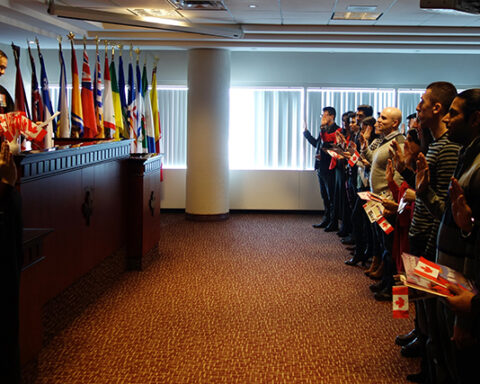What happened to former Citizenship and Immigration Minister Jason Kenney’s cracking down on birth tourism: women coming to Canada to give birth so that their children would obtain Canadian citizenship?
It appears to have died stillborn, but not before offering us a few lessons about policy making at the highest levels of government and the media coverage that plays into exaggerated government rhetoric.
In 2012, Kenney’s rhetoric was characteristically strong: “We need to send the message that Canadian citizenship isn’t just some kind of an access key to the Canadian welfare state by cynically misrepresenting yourself…”
Others piled on. Jan Wong said “it’s difficult not to feel like a nation of suckers.”
Yet, when announcing changes to the Citizenship Act, Immigration Minister Chris Alexander lowered expectations, noting that, “We have to make sure we get it right in a way that doesn’t disrupt the vast majority of Canadians who are having their legitimate births in hospitals, but does detect and deter those cases where our generosity is being abused.”
Provincial domain
Release of Access to Information documents from 2011 and 2012 shed light on what happened.
While it was a priority, the federal government could not do it alone given provincial responsibility for birth registration.
Provincial consultations highlighted operational and cost considerations of including citizenship on birth certificates, the initially preferred option given that this would not require Canadians to provide additional identification to access services.
Moreover, new funding would be required for both levels of government.
Kenney’s rhetoric was characteristically strong:“We need to send the message that Canadian citizenship isn’t just some kind of an access key to the Canadian welfare state by cynically misrepresenting yourself…”
The other option, issuing citizenship proofs for all those born eligible for citizenship, would be costly for Citizenship and Immigration Canada and would require Canadians to present two documents (birth certificate and citizenship).
Ontario, with 37 per cent of all Canadian births, may have helped kill both proposed options, noting there “is not enough evidence to justify the effort and expense for such a system-wide change.”
The final recommendation to Ministers nevertheless was to signal the intent to change birthright citizenship, allow time for consultations, and return to Cabinet with a request for funding.
Anecdotes v. Evidence
But documents make clear the insignificance of birth tourism. Officials could only identify about 500 cases of suspected birth tourism out of an annual average of some 360,000 live births in Canada, or 0.14 percent.
CIC public consultations in 2013 resulted only in more anecdotes, not hard evidence.
The government intended to apply this change to all temporary residents (e.g., workers, live-in-caregivers, refugee claimants, international students). Neither Minister ever publicly admitted to this broader scope, and none of the background material provides, apart from refugee claimants, estimated numbers of births to temporary residents.
So is this a real issue?
Reducing fraud and abuse is legitimate and necessary, reflects sound management, and preserves confidence among Canadians regarding the fairness and integrity of citizenship.
Anecdotes help identify issues, and should not be dismissed. CIC officials made efforts to obtain concrete evidence but did not access provincial medicare statistics on live births not covered by medicare, which would include “birth tourists”.
An impartial observer would conclude that there is no business case, given the small numbers, operational and financial implications.
The decision note for the Minister appears schizophrenic, laying out the case for no change, while still recommending publicly signalling reform.
Release of these documents confirms this is no longer a priority, given the embarrassing lack of evidence.
CIC will be busy implementing many changes to the Citizenship Act over the next 10 months. This will be the focus of officials given the complex coordination and oversight required.
Minister Alexander admitted to Chinese Canadian media that it was “not a priority” given “the small number of offenders.”
But it is clear that allegations of abuse play to the value Canadians attach to fairness, and fits into the overall Government message and politics of cracking down on fraud.
But the evidence we have clear: there is no business case to inconvenience millions of Canadians, for whom a birth certificate may no longer be sufficient identification, and cost taxpayers significant amounts to address a tiny problem.
Minister Alexander’s spokesperson recently stated, refreshingly, that decisions will be “informed by facts,” rather than anecdotes.
Ontario, with 37 per cent of all Canadian births, may have helped kill both proposed options, noting there “is not enough evidence to justify the effort and expense for such a system-wide change.”
Drawing lessons
What general lessons can we draw from this?
First, anecdotes drive identification of policy issues.
Second, rhetoric runs ahead of evidence.
Third, the provinces provided the most effective brake on anecdote-driven policy given that any workable response required their cooperation. Contrast this to the Citizenship Act changes, where the Government had no need to be flexible.
Fourth, funding implications and provincial constraints ensured evidence trumped anecdote.
While the Government appears to have dropped the issue, it does make sense to work closely with the provinces to obtain accurate statistics on births not covered by medicare. These statistics would provide a reasonable proxy and help ensure that future decisions would be based on facts, not anecdotes, provide context for future media coverage and serve as a model for other policy areas.
Andrew Griffith is the author of Policy Arrogance or Innocent Bias: Resetting Citizenship and Multiculturalism and is a regular media commentator and blogger (Multiculturalism Meanderings). He is the former Director General for Citizenship and Multiculturalism and has worked for a variety of government departments in Canada and abroad. This comment also appeared in the Hill Times.
Andrew Griffith is the author of Multiculturalism in Canada: Evidence and Anecdote, Policy Arrogance or Innocent Bias: Resetting Citizenship and Multiculturalism and many other works. He is a former Director-General of Citizenship and Immigration Canada, Citizenship and Multiculturalism branch. He regularly comments on citizenship, multiculturalism and related issues, in this blog and the media.





